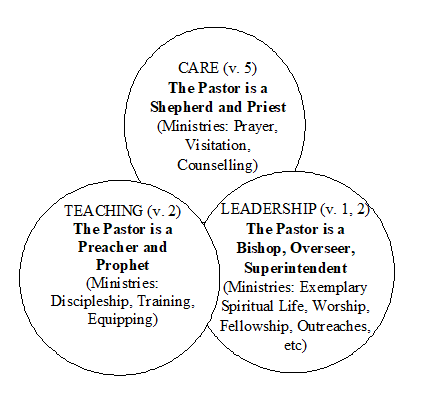COMPETENT MINISTRY
( 2 Timothy 4:5 )
Competency in gospel ministry is ability and skill to perform gospel tasks with satisfaction and positive results. The first two core values (vibrant spirituality and sound academics) are the most basic pre-requisites to develop and demonstrate faithfulness, commitment and effectiveness in ministry. Competency in ministry requires a godly lifestyle with correct head knowledge and skillful hands.
The foundation for competent ministry is a life of integrity and honour characterised by:
- Matthew 6:24: Personal resolve to serve God, to love God, to be devoted to God, to hate and despise Mammon (Money).
- I Timothy 4:12: Exemplary speech, life, love, faith and purity.
- I Timothy 4:16: I Corinthians 4:17: Agreement of speech (doctrine/teaching) and lifestyle; harmony of life and teaching.
- I Timothy 3:2: Living above reproach as seen in Job (1:1; 8b), and Daniel (6:4-5).
The call to be a gospel minister is a call to a lifestyle of integrity and honour (Hebrews 5:4; I Timothy 5:17). The first task of Christian leadership is for the leader to lead himself/herself in righteousness, faithfulness, holiness, and godliness. NBTS aspiration to raise competent ministers of the New Covenant is based on the biblical revelation. 2 Corinthians 3:4-6 is key to the discussion of competence in gospel ministry.
Such confidence as this is ours through Christ before God. Not that we are competent in ourselves to claim anything for ourselves, but our competence comes from God. He has made us competent as ministers of a new covenant –not of the letter but of the Spirit: for the letter kills, but the Spirit gives life. (NIV)
There are two key ideas in this scriptural text that relate to competence in gospel ministry.
- Possibility of confidence to acquire competence. This is no pride or arrogance but an affirmation of what God is able to do, and indeed what God desires to do in the lives of ministers.
- The competence of a gospel worker is given by God through the ministry of the Holy Spirit. Competence is a spiritual phenomenon. The more that the gospel minister experience and depend on the power of the Holy Spirit, the more competent he/she becomes.
Basic Areas of Competence
Christian leadership is shepherding. There are many varieties of gospel ministries – church pastoring, teaching, music, evangelism, missions, etc. However, every Christian leader provides services that relate to the shepherding work of Christ as King, priest and prophet. The three dimensions for cultivation and demonstration of competence in gospel ministry are: leadership, care and communication. These three areas are to be seen in the requirements and qualities for pastoral work as stated in I Timothy 3:1-7. (Nihinlola: A Practical Handbook for Church Administration, 2020, 4).

- Leadership Ministries: In whatever role and level, every gospel minister provides leadership to serve God and the people of God. Leadership requires diligence (Rom. 12:8c) and the most basic tasks of every leader according to The Maxwell Leadership Bible (2007, 910) are “The ability to cast vision, plan strategy, direct teams and empower others.” Every gospel minister need to develop competence in these four areas.
- Caring Ministries: Effective Christian leadership for ministries ought to balance supporting and supervising others. The competent minister thus nurture personal, spiritual relationship beyond the official task of the body, group, and organization (church, committee, department, institution, or denomination). This is a priestly role to pray and intercede for those receiving ours services and mentoring, encouraging and counseling them to grow in obedience to the Word of God. The extent of care for people is a good index to determine the competence of a minister.
- Communication Ministries: In the protestant tradition and evangelical heritage, to which Baptists subscribe, the Lordship of Jesus Christ as recorded in the Word of God (biblical revelation) is the final authority in matters of Christian faith and practice. The gospel minister is thus a minister of the Bible and the effective preaching and teaching of the Bible is a mark of competence in ministry. Communication of biblical revelation is an instrument to advance the Kingdom of God.
Development of Competence
Ministerial techniques and skills can be developed through a number of means:
- Natural talents: This is to be submitted to God and sanctified by the Holy Spirit to prosper the gospel e.g fine arts, music/drama. It should be stated that natural talents, including native intelligence, need training. God of creation is also God of redemption. The Spirit of God equip some persons with knowledge and skills for craftwork (Exodus 31:1-5). Some others have gifts of dream and vision (Joel 2:28). The training of spiritual faculties for obedient Christian life includes strengthening feeble hands and knees (Hebrews 12:12).
- Spiritual gifts: The gifts of the Holy Spirit are the best resource for competence in gospel ministry. Spiritual gifts make people fit for specific roles in the body of Christ and society. Competent Christian leaders help growing Christians to discover, develop and deploy their spiritual gifts for service in the organization. It is indeed a beautiful thing where there is correspondence between gifts and roles. The following gifts of the Spirit are needed for gospel ministries:
| Ministry | Relevant Spiritual Gift(s)/Natural Talents |
|
Care – Prayer – Visitation – Counseling – Healing – Deliverance |
Help, Mercy, Tongues/Interpretation Help Exhortation, Dream/Vision Healings, Discernment, Mercy Knowledge, Miracles |
|
Leadership – Worship – Outreaches – Mission / Evangelism – Administration – Presiding/Moderating/Coordination – Encouragement |
Tongues/Interpretation Evangelism, Music, Drama Apostles, Administration/Aid/Leadership Wisdom Encouragement |
|
Proclamation – Preaching – Teaching – Discipleship – Training |
Prophecy Teaching, Arts |
| General | Faith |
- Education and Practice: People can receive basic instructions about how to perform certain ministerial roles in theological education. Of course learning is a life-long process through informal, continuing education platforms – conferences, seminars and workshops. Skills and competence are thus developed and improved through regular practice.
Hallmarks of Competence
Every Christian organization is expected to provide a position and job description for the specific services to be rendered by a gospel minister. Similarly, most organizations have and use Annual Performance Evaluation form which contain indices to measure the performance of duties and so the effectiveness and competence of every worker. This ought to apply to every gospel minister as well. NBTS Motto, 2 Timothy 4:5 is rendered in two Bible versions thus: “discharge all the duties of your ministry” (NIV) and “fully carry out the ministry God has given you.” (NLT) This directive implies competence. However, in view of the uniqueness of the call to gospel ministry, a very important index to evaluate the effectiveness and competence is contribution to the advancement of the gospel, the Great Commission and the expansion of the Kingdom of God. Therefore the hallmarks that determine ministerial competence are:
- Romans 10:10-11: Redemption of souls; confession of the lordship of Jesus Christ; Repentance of sin, evil and wickedness.
- Romans 12:2: Spiritual growth of Christians: Christian life and experience (devotion – prayer and the Word of God), discipleship and transformation.
- Matthews 5:13-16: Commitment to Christian service, stewardship of life, time, body, possessions, and influence. Development of community through social service: education, health, etc.
- Matthews 16:18-19; Acts 2:42-47: Healthy church life, church planting and growth (spiritually, numerically, physically/materially and financially).
- Acts 6:7: advancement of an organization (team, committee, board, department, institution, church, etc) through the achievement of objectives. Ministerial performance must be seen to be relevant to the needs and context of an organization.
Illustrative Examples
King David: He was a competent King: he demonstrated skills and competence in a number of ways:
- I Chronicles 16:1-6: Organization of choir in the temple
- I Samuel 16:23: Musical instrument: Playing of harp to bring relief and deliverance.
- I Samuel 17:40, 49: The use of sling and stones to confront and kill Goliath in battle.
- Psalms 78:72: Integrity of heart and skillful hands.
Apostle Paul: Evangelist, Missionary, Theological Educator.
- Romans 16:19-20: He preached the gospel and planted churches from Jerusalem to Illyricum.
- I Corinthians 3:10: By the grace of God, he planted the church in Corinth as a master builder (with expertise)
- I Corinthians. 15:10: By the grace of God he worked extremely hard (diligence).
Hymn: “Soldiers of Christ, in Truth Arrayed”
- Soldiers of Christ, in truth arrayed,
A world in ruins needs your aid:
A world by sin destroyed and dead;
A world for which the Savior bled.
- His gospel to the lost proclaim,
Good news for all in Jesus’ name;
Let light upon the darkness break
That sinners from their death may wake.
3 . Morning and evening sow the seed,
God’s grace the effort shall succeed.
Seed times of tears have oft been found,
With sheaves of joy and plenty crowned.
4 . We meet to part, but part to meet,
When earthly labors are complete,
To join in yet more blest employ,
In an eternal world of joy.
Prayer: Pray that God will make you competent as a minister of the new covenant.
